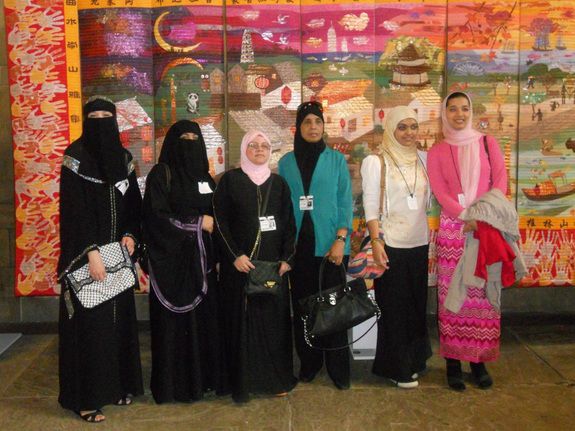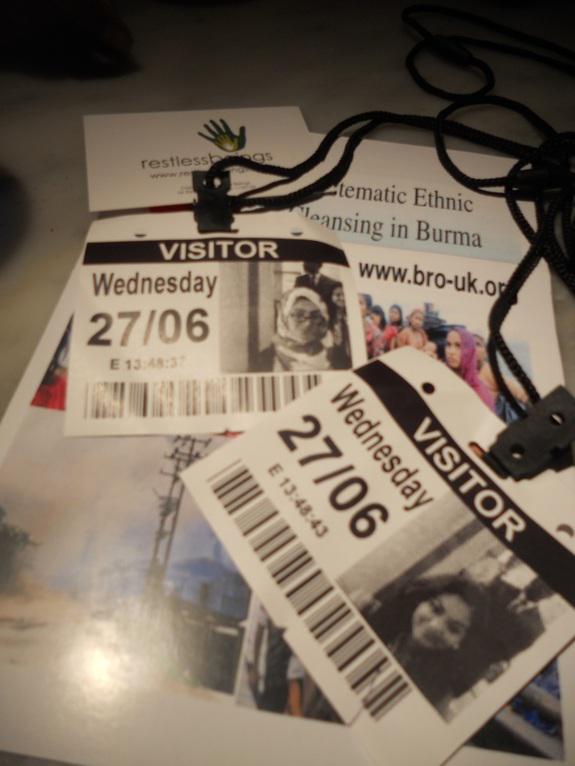


Restless Beings were honoured to be invited to a briefing at the British Parliament, the topic being ‘’Stateless, Marginalized & Persecuted, The Rohingya People of Burma’’.
The aim of the briefing was to raise awareness of the human rights abuses of the Rohingyas and to set forth a dialogue of how to campaign to make a difference to the situation.
The briefing was centred around an esteemed panel consisting of Rt. Hon The Baroness Kinnock of Holyhead, BROUK president Tun Khin, Chris Lewa- the Co-ordinator for the Arakan Project and Benedict Rogers from Christian Solidarity Worldwide. Amongst the audience were other members of parliament, including Rt. Hon The Baroness Uddin and various representatives of different charities including Human Rights Watch, Refugees International and HART.
Most of the same supporters had been at the House of Lords only a few days ago, to see Aung Saan Suu Kyi deliver her speech, though, their reason for being in the House of Lords today expressed what Suu Kyi had so elegantly avoided, the issue of the current situation of the Rohingyas.
Tun Khin spoke of the incidents since the spark of the violence almost 3 weeks ago, now relying on scarce reports on the ground with all international NGO staff being removed. He had recently learned that around 60 girls have been raped and then kidnapped by a group of local Rakhines and Nasaka. Amidst the fear and destruction of homes, 80,000 Rohingya have been displaced since the beginning of June and a further 10,000 have fled since June 16th. Many fled after their villages were burnt down but as Chris Lewa pointed out they are now prohibited from returning, with the Rakhines now settling in the homes that were once theirs. Lewa alluded to yet more discriminatory laws against the Rohingya and in particular when concerning citizenship, though they have been in Burma for more than 800 years, a Chinese, Indian or Indonesian would have more chance of naturalisation than them.
Ben Rogers, having visited Burma on over forty occasions has had the opportunity to speak to many of the communities in Burma, each having suffered in some way, be it the Buddhist Monks, the Rakhines, those Internally displaced and the Rohingyas. Significantly, he said the bleakest of his visits have been to the Bangladesh Rohingya refugee camps.
Certainly during the last few weeks of violence, stemming from civil, but soon becoming state sponsored violence, it is important to recognise all groups involved. However in an unfortunate way, it is with this resurgence of violence that decades worth of deep rooted violence and persecution against the Rohingyas has surfaced and come to light. It is therefore not about about pro Rakhine or pro Rohingya, but pro human rights. Pro the right of any people to live with dignity and freedom.
With a short opportunity to speak after the panel segment, Restless Beings highlighted the need for global awareness and campaigning to both the British government to act and provide aid and the Bangladesh government to open it’s borders to the Rohingya refugees. Further we were keen to learn how the youth in Britain and across the world, not affiliated to any organisation, can make a difference on an international level when the mainstream media are still not covering the events in full.
Ben Rogers and Baroness Uddin both agreed on the need for international activism and being the change, rather than waiting for a global response, with the help of influential voices working together in a peaceful, constructive manner to ease the situation.
The need to raise awareness and champion human rights, in a very simple sense, is two fold. Where the mass media are not reporting the atrocities, we-the international community -must through any means raise awareness. The Rohingya are a modern day Palestine, displaced, persecuted and barely ‘living’ in their own homeland. We must ensure their struggles are heard and known. Baroness Uddin also stressed the need to demonstrate to the Bangladeshi community the cruelty and ethnic cleansing which is taking place against the Rohingyas, and their desperate situation akin to the Bangladeshi’s during the 1971 Liberation War, which Uddin experienced.
The second part is then to campaign for change through the governmental bodies.
Ben Rogers stressed the importance of petitions and peaceful protests and for British citizens to lobby their MP’s and ask them to bring the issue up in debates, allowing the politicians to be aware of a demand for international change, though geographically far away.
Indeed, many politicians adopt a more cautious and optimistic approach with regards to Burma’s ‘semi democratic state’, fearing that too much pressure will cause the state to become unstable. However, if anything, during this ‘road to reform’ now is the time that we need to approach with more pressure to ensure that just and fair laws are implemented for ALL.
Wakar Uddin the Director of the Arakan Rohingyan Union, based in the USA , summed up the extent of the current situation in East Asia: “The problem is no longer a Rohingya issue, it is no longer a Burmese issue, it is now a problem which lies on an international level”.
Though the problem may not be on our doorstep, for the sake of human rights, regardless of race and religion, we must act.
We urge you to sign the petition to compel the Bangladesh government to open their borders to the Rohingyas trying to escape the long suffered tyranny in their homeland and to join us in protest next week outside the Bangladesh High Commission on Monday 2nd July.

